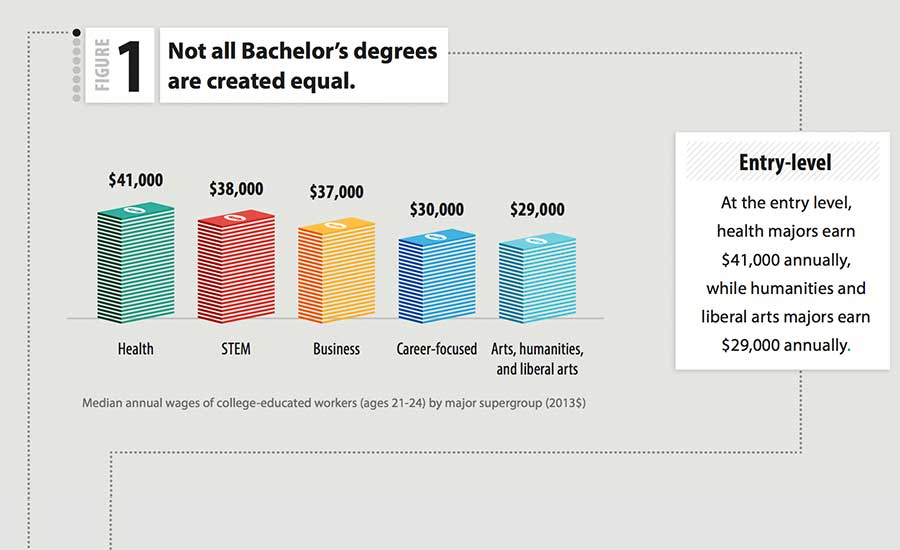Your College Major Is More Important Than You Think

By:
A new report from Georgetown University’s Center on Education and the Workforce reveals that not all majors are created equal, so while college graduates tend to earn more than their high school educated counterparts, a person's area of study in college determines how much they will earn for the rest of their lives. This could help explain why a quarter of freshman switch majors before the end of their first year.
Looking at the wages of 137 college majors, researchers found that STEM (science, technology, engineering and math) and business majors were the highest paid majors. Forty-six percent of all college graduates majored in STEM or business as well, and it's easy to see why: over a lifetime, those with the top-paying majors earn $3.4 million more than the lowest paying majors.
"What determines what you make in life is not where you go to college, but the subject you take when you get there," Georgetown University professor Anthony Carnevale and study lead author told Reuters. "In the American mind the goal is to just go to college and get a degree, but to some extent that is missing the point."
Carnevale added that engineering is especially appealing because it's well-paid, and you don't necessarily need to go to graduate school to make a decent living.
"Engineering degrees are almost all of the top 10," he continued. "In particular, petroleum engineering has busted out of the pack. The market is so tight that you don't even need a graduate degree. It's like a gold mine."
This is consistent with recent findings from U.S. News & World Report, which revealed a decrease in law school enrollment and jump in engineering graduate degrees, which are much more affordable than a law school education.
STEM, health, and business majors receive the highest starting pay at roughly $37,000 per year. Over the course of their careers, people in these fields earn an average of $65,000 and can hit $100,000 or more annually during their peak earning years.
While there are many perks to engineering, University of Maryland economics professor Melissa Kearney told The Wall Street Journal that this doesn't mean everyone should major in it, as they have to consider their skill set before deciding on an area of study.
“People have to think very carefully about what they’re good at,” Kearney told the publication. “Yes, engineering pays very well. But that’s not going to serve someone who really struggles with quantitative skills.”
The prospects aren't so good, however, for those who studied the arts, especially at the beginning of their careers. For example, the average health major brings home $11,000 more than the average liberal arts major when first entering the workforce, according to the findings:
 Georgetown University - georgetown.edu
Georgetown University - georgetown.edu
Carnevale told Reuters that it's a shame early childhood education is the lowest paying major at a median salary of $39,000.
"That's one of the sad things about these numbers: That people who serve others, like teachers, don't make as much as other majors. They do have pretty high job security, but in terms of wages, they're the bottom of the heap."
Other low paying majors were human services and community organization at $41,000, studio arts, social work, teacher education, and visual and performing arts at $42,000, theology, religious vocations, and elementary education at $43,000, and drama, theater arts, family, and community service at $45,000.
But Carnevale doesn't want these numbers to discourage people from pursuing lower paying majors if that's their true calling in life. If you're the best at what you do, the money is likely to follow.
"Your major is important, but it's not your destiny," he told Reuters. "You can take a lower-earning major like education, but if you have a strong career and are in the top 25 percent of your field, you can make as much or more than a business major. So people who do well in their careers come out OK, no matter what they take."
